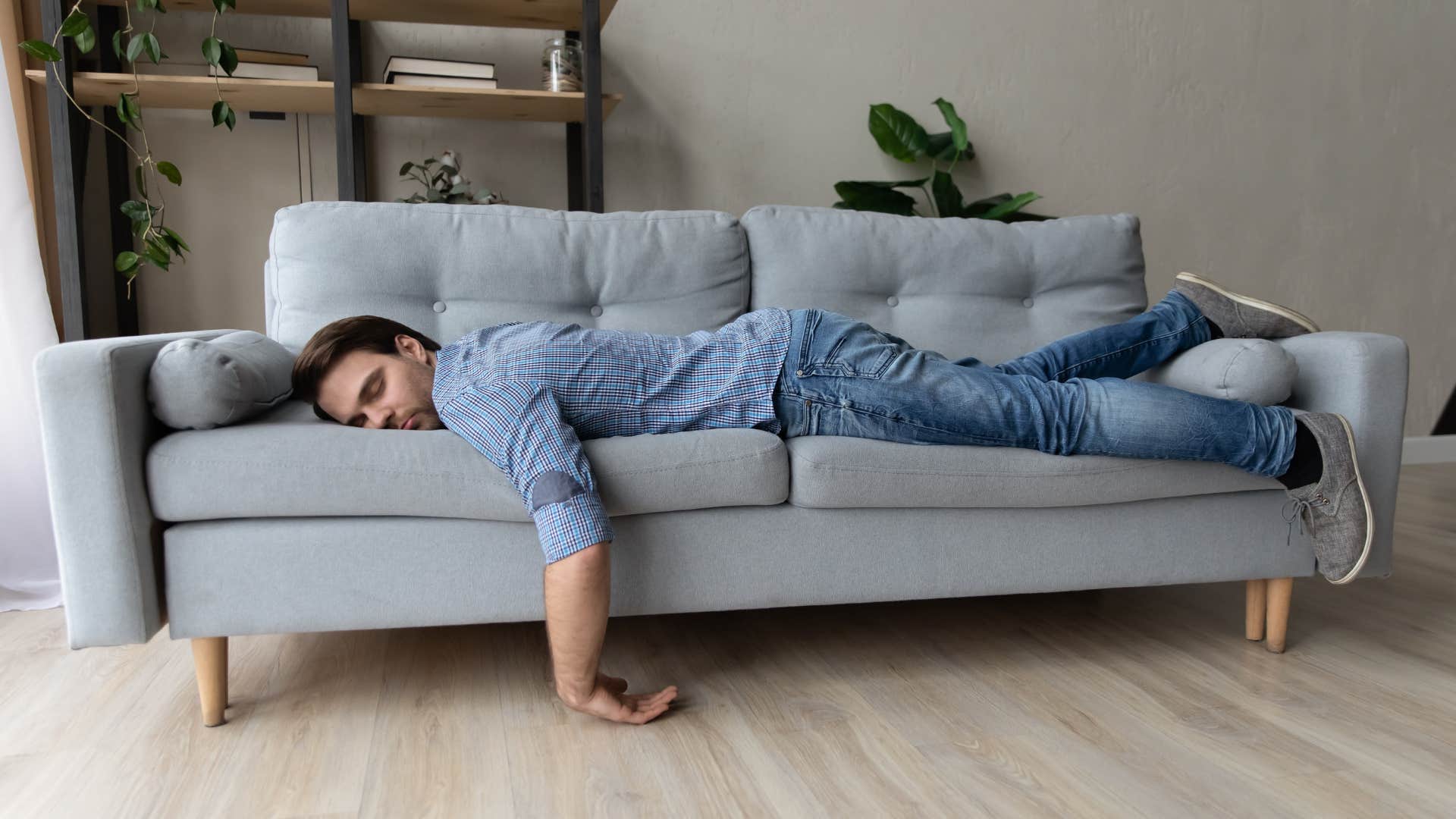If You Notice These 11 Things At A Man's House, He's Struggling More Than He Admits
Men tend to hide their true feelings, even when their mental headspace isn't in the right place.
 ShotPrime Studio | Shutterstock
ShotPrime Studio | Shutterstock Many men struggle with verbalizing their internal feelings and expressing vulnerability when they're going a rough patch in life, according to a study from the American Journal of Men's Health, so it's not entirely surprising that it's often the small areas of their lives that serve as much bigger red flags when it comes to their mental health.
So, if you're a partner, a parent, or a friend trying to support a man in your life, they're probably not going to come to you directly and ask for help and advice. It will be the small things — like clutter, a declining sense of enthusiasm, or a disengagement from the things he once found enjoyable — that are real signs they need help. Even in their living space, from clutter to noise, if you notice these things at a man's house, he's struggling more than he admits
If you notice these 11 things at a man's house, he's struggling more than he admits
1. Tons of distractions
 Rachata Teyparsit | Shutterstock
Rachata Teyparsit | Shutterstock
Whether it's a million YouTube videos playing around the house, several screens, or half-finished projects lingering about, having tons of distractions at home is one of the signs a man is struggling more than he admits.
While distractions can be occasionally productive for people dealing with intense trauma or mental health struggles, according to psychology professor Matthew Tull, leaning on them in the long-term only does more damage than good. So, if you're noticing these things, consider providing a helping hand, even if that means getting them out of their house, connecting them with professional support, or simply being there as a listening ear or shoulder to cry on.
2. Dirty dishes and overflowing laundry
 Andrey_Popov | Shutterstock
Andrey_Popov | Shutterstock
Our household labor and the chores we're responsible for at home may seem insignificant to larger issues like mental health, but in reality, the two are closely linked. Not only does doing chores and keeping up with cleanliness promote a more balanced and happy mind, when our mental health is slipping, so too does our motivation and discipline with doing these tasks.
So, if you notice things like dirty dishes overflowing in the sink or weeks worth of dirty laundry at a man's house, he could be struggling more than he admits. According to a 1999 study on men's health, it's not uncommon for men to be indirect when they need help and support — battling with fears of judgment, social stigmas, and struggles with vulnerability. Sometimes, simply noticing these little things and reaching out for support is the bridge they need to find help and peace.
3. No personal decor or vibes
 Prostock-studio | Shutterstock
Prostock-studio | Shutterstock
According to a study from the Australian & New Zealand Journal of Psychiatry, many people who struggle with their mental health also experience a loss of identity and self-concept, making things like creative outlets, hobbies, and even decoration at home that much more difficult. They struggle with self-esteem that affects relationships, a loss of identity that makes life feel unfulfilling, and emotional numbness that impacts all of it.
So, if you notice a lack of personal decor and touches in a man's house, it's possible he could be struggling with his identity or mental health more than he admits.
4. Unopened mail or bills
 voronaman | Shutterstock
voronaman | Shutterstock
Even if it seems subtle, things like unopened mail and bills could be signs that someone is struggling more than they admit — dealing with executive function issues and motivation at home that nobody else generally sees. While you might not be around as they navigate their daily routines and responsibilities, little signs like unopened mail or bills piling up could be a red flag.
In some cases, a man's inability to open his mail could be rooted in a chronic "fight or flight" response. He's so busy dealing with internal turmoil that basic tasks like getting the mail or paying bills feels impossible.
5. Empty walls or a lack of decor
 fizkes | Shutterstock
fizkes | Shutterstock
Similar to a lack of personal touches in a home, if you notice these things at a man's house, he's struggling more than he admits. When someone is struggling with emotional turmoil or dysregulation, the permanence of things like decorating a living space can feel overwhelming and difficult.
Not only is the lack of decor itself a manifestation of mental health struggles, living in a space that doesn't reflect personal style, desires, or identity can further amplify and exacerbate these issues they're already experiencing.
6. Overused tissue boxes
 antoniodiaz | Shutterstock
antoniodiaz | Shutterstock
While things like overused tissue boxes at home are more metaphorical for noticing a man you know is struggling with their mental health, it can be a physical manifestation of their fear of vulnerability with others.
They may retreat home or avoid hard conversations with loved ones — suppressing emotions in ways they were taught to from a young age — only to let all that struggle and discomfort bubble up when they're alone at home. Of course, expressing these emotions is important for healing, like a study from Psychological Science argues, but it's most productive when they have someone else to support and lean on.
7. A lack of furniture
 wavebreakmedia | Shutterstock
wavebreakmedia | Shutterstock
Men struggling with their mental health and low self-esteem tend to engage in behaviors that keep them from building trust with themselves, forming strong relationships, and setting themselves up for success. Whether it's suppressing their emotions, constantly distracting themselves, or self-isolating, their coping mechanisms tend to align with toxic societal expectations for men, rather than true growth and healing.
Even things like making big decisions in their home — like buying furniture or investing in a better mattress for sleep — are struggles for a man who's dealing with mental health issues. So, if you notice these signs of executive dysfunction in a man's home, chances are he could be struggling more than he admits with any of these specific things.
8. Tons of professional work
 fizkes | Shutterstock
fizkes | Shutterstock
Being overworked and experiencing burnout doesn't just contribute to mental health struggles and fatigue, it can also be a tactic that men struggling with emotional turmoil use to avoid addressing their issues. They suppress emotions and distract themselves with work to avoid feeling things too intensely, even if it sets them up for dysregulation and social isolation down the road.
So, if you notice tons of work or clear evidence that a man is overworking himself at home, it could be a sign that he's struggling more than he admits.
9. No dining room table
 MAYA LAB | Shutterstock
MAYA LAB | Shutterstock
It may seem obvious and simple, but having a dining room table is one of the most important parts of a home. Not only does it encourage better, more intentional eating habits, it often serves as a space for social interaction and mindfulness that other areas of the home simply can't beat.
So, if a man doesn't have a dining room table — whether it's because he's struggling with buying one or dealing with dysfunction around making decisions — it could be both a side effect and a contributing factor to his emotional and mental struggles.
10. No hygiene supplies or products
 Perfect Wave | Shutterstock
Perfect Wave | Shutterstock
Hygiene, in general, is inherently associated with mental health, whether it's things like sleep hygiene and habits or literal self-care and wellness practices on a daily basis.
If you notice a man is lacking hygiene supplies like toilet paper, soap, face wash, and other products at home, it could be a sign that they're not taking care of themselves and are struggling more than they'd like to admit.
11. No signs of recent visitors
 SeventyFour | Shutterstock
SeventyFour | Shutterstock
According to psychotherapist Erin Leonard, avoidance is largely associated with accountability. Men struggling with vulnerability may avoid conflict with their partners, while others self-isolate to deal with acknowledging their internal struggles and turmoil. So, if you notice that there haven't been many visitors at a man's house, it could be a sign that he's self-isolating and struggling more than he admits.
A Missouri Medicine study suggests that social isolation and loneliness on its own — not having strong connections or interactions with others — could be a cause for mental health and physical concerns in men. They are left only to unpack their own thoughts or, more realistically, distract and suppress them, which causes a lot of anxiety and sadness at home.
Zayda Slabbekoorn is a staff writer with a bachelor's degree in social relations & policy and gender studies who focuses on psychology, relationships, self-help, and human interest stories.

